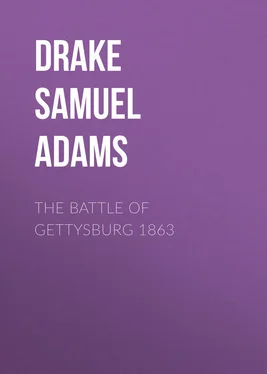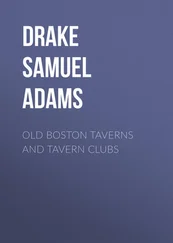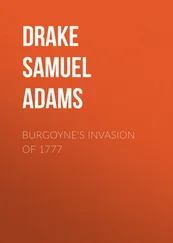Samuel Drake - The Battle of Gettysburg 1863
Здесь есть возможность читать онлайн «Samuel Drake - The Battle of Gettysburg 1863» — ознакомительный отрывок электронной книги совершенно бесплатно, а после прочтения отрывка купить полную версию. В некоторых случаях можно слушать аудио, скачать через торрент в формате fb2 и присутствует краткое содержание. Жанр: foreign_antique, foreign_prose, на английском языке. Описание произведения, (предисловие) а так же отзывы посетителей доступны на портале библиотеки ЛибКат.
- Название:The Battle of Gettysburg 1863
- Автор:
- Жанр:
- Год:неизвестен
- ISBN:нет данных
- Рейтинг книги:5 / 5. Голосов: 1
-
Избранное:Добавить в избранное
- Отзывы:
-
Ваша оценка:
- 100
- 1
- 2
- 3
- 4
- 5
The Battle of Gettysburg 1863: краткое содержание, описание и аннотация
Предлагаем к чтению аннотацию, описание, краткое содержание или предисловие (зависит от того, что написал сам автор книги «The Battle of Gettysburg 1863»). Если вы не нашли необходимую информацию о книге — напишите в комментариях, мы постараемся отыскать её.
The Battle of Gettysburg 1863 — читать онлайн ознакомительный отрывок
Ниже представлен текст книги, разбитый по страницам. Система сохранения места последней прочитанной страницы, позволяет с удобством читать онлайн бесплатно книгу «The Battle of Gettysburg 1863», без необходимости каждый раз заново искать на чём Вы остановились. Поставьте закладку, и сможете в любой момент перейти на страницу, на которой закончили чтение.
Интервал:
Закладка:
Superiority as Marksmen.
The infantry were armed with Enfield rifles, fresh from British workshops, and it is probable that no equal number of men ever knew how to use them better. Indeed, we consider it indisputable that the Confederates greatly excelled the Union soldiers as marksmen. Most of them were accustomed to the use of firearms from boyhood; in some sections they were noted for their skill with the rifle. The Confederates, therefore, were nearly always good shots before they went into the army, while the Union soldiers mostly had to acquire what skill they could after going into the ranks. In the South the habit of carrying arms was almost universal: in the North it was not only unusual, but unpopular as well as unlawful.
Superiority in Cavalry.
Man for man, the Confederate cavalry was also superior to the Union horse, because in one section riding is a custom, in the other a pastime rarely indulged in. Consequently, it took months to teach a Union cavalryman how to ride, – a costly experiment when your adversary is already prepared, – whereas if there is anything a Southerner piques himself upon, it is his horsemanship. 10 10 The main body, under Stuart, had gone around the rear of the Union army, by Lee's permission, in the expectation of harassing it while on the march, and of then rejoining Ewell, on the Susquehanna. It failed to do either, and many attribute all of Lee's misfortunes in this campaign to the absence of Stuart.
Cavalry Advance.
Cumberland Valley raided.
Lee's cavalry had preceded the infantry by nearly a week, reaching Chambersburg on the 16th, seizing horses and provisions for the use of the army behind them, and spreading consternation to the gates of Harrisburg itself. Having loaded themselves with plunder unopposed, they then fell back upon the main army, thus leaving it in some doubt whether this raid accomplished all it designed, or was only the prelude to something for which it was serving as a mask. 11 11 Jenkins, who commanded, was paid in his own coin at Chambersburg, by the proffer of Confederate scrip in payment for some alleged stolen horses. He himself had been professedly paying for certain seized property in this same worthless scrip.
Ewell at Chambersburg.
Hood's Soldiers.
All doubts were set at rest, however, when, on the 23d, Ewell's dust-begrimed infantry came tramping into Chambersburg, regiment after regiment, hour after hour, until the streets fairly swarmed with them. Though the houses were shut up, a few citizens were in the streets, or looking out of their windows at the passing show, as men might at the gathering of a storm-cloud about to burst with destructive fury upon them; and though the time was hardly one for merriment, we are assured that some of these lookers-on could not refrain from "pointing and laughing at Hood's ragged Jacks" as they marched along to the tune of "Dixie's Land." "This division," remarks the partial narrator, "well known for its fighting qualities, is composed of Texans, Alabamians, and Arkansians, and they certainly are a queer lot to look at. They carry less than any other troops; many of them have only got an old piece of carpet or rug as baggage; many have discarded their shoes in the mud; all are ragged and dirty, but full of good-humor and confidence in themselves and their general. 12 12 Contrast this with the generous, even prodigal, way the Union soldiers were provided for, and who can doubt the devotion of these ragged Confederates to their cause?
They answered the numerous taunts of the Chambersburg ladies with cheers and laughter." To the scowling citizens the Confederates would call out from the ranks, "Well, Yank, how far to Harrisburg? How far to Baltimore? What's the charge at the Continental?" or some such innocuous bits of irony as came into heads turned, no doubt, at the thought of standing unchallenged on Northern soil, where nothing but themselves recalled war or its terrors, or at sight of the many evidences of comfort and thrift to which they themselves were strangers. But we shall meet these exultant ragamuffins ere long under far different circumstances.
This was Lee's corps of observation, destined to do most of the hard marching and fighting which usually falls to the lot of the cavalry, as it was mostly composed of old, well-seasoned soldiers, who had been accustomed, under the lead of Jackson, to win their victories largely with their legs. Part marched through the town, and went into camp on the Carlisle road, part occupied the pike leading toward Gettysburg; sentries were posted in the streets, a military commandant was appointed, and for the time being Chambersburg fell wholly under rebel rule, which, so long as it remained the army headquarters, we are bound to say does not appear to have been more onerous than circumstances would warrant.
Main Army comes up.
Ewell's corps was followed, at one day's march, by the main body, comprising Hill's and Longstreet's corps, with whom marched Lee himself, the man on whom all eyes, North and South, were now turned.
Ewell to Carlisle.
Early to York.
As soon as the main body had come up Ewell moved straight on toward Carlisle and Harrisburg with two divisions, while his third turned off to the east, toward York, with the view of drawing attention away from the main object by seeming to threaten Baltimore or Philadelphia. 13 13 So long as this division remained at York, the question as to where Lee meant to concentrate would be still further confused. See diagram.
It was to strike the Susquehanna at Columbia, and get possession of the railway bridge there, as a means of passing over to the north side of that river to Harrisburg.
Early at Gettysburg.
This division (Early's) passed through Gettysburg on the 26th, 14 14 Early levied a contribution on the borough, which the town council evaded by pleading poverty.
reaching York the next day. On the 28th his advance arrived at the Susquehanna too late to save the railway bridge from the flames. 15 15 A small Union force which had been holding the bridge set it on fire on the approach of the Confederates.
On this same day Ewell's advance encamped within four miles of Harrisburg, where some skirmishing took place.
Region seized by Lee.
Here, then, was Lee firmly installed within striking distance of the capital of the great Keystone State, and by no means at so great a distance from Philadelphia or Washington as not to make his presence felt in both cities at once.
If he had not come prepared to fight every soldier that the Federal government could bring against him – to fight even against odds – what was he doing here in the heart of Pennsylvania?
Spirit of his Army.
The army which followed Lee into Pennsylvania was brave and devoted – none more so. It looked up to him with a species of adoration, born of an abiding faith in his genius. Reasoning from experience, the belief that it would continue to beat the Union army was not unfounded. At any rate, it was universal. Thus led, and imbued with such a spirit, no wonder the Confederate army considered itself invincible.
Thus followed, Lee, or Uncle Robert, as he was familiarly called by his soldiers, though no man could be more aristocratic in his tastes or manners, was accustomed to exact greater efforts from them, both in marching and fighting, than the Union generals ordinarily could from their better-fed, better-clothed, and better-disciplined troops.
Lee's Portrait.
A pen portrait of General Lee himself, as he appeared at this time, seems necessary to the historical completeness of this sketch. It is drawn by a British colonel, 16 16 This was Colonel Freemantle, who has a good word for everything Confederate. On being courteously received within the Union lines after Gettysburg, he was much surprised to find that the officers were gentlemen.
on leave with Lee's army, where he found himself quite at home. He says: "General Lee is, almost without exception, the handsomest man of his age I ever saw. He is fifty-six years old, tall, broad-shouldered, very well made, well set up – a thorough soldier in appearance; and his manners are courteous and full of dignity. He generally wears a well-worn long gray jacket, a high black felt hat, and blue trousers tucked into his Wellington boots. I never saw him carry arms, and the only marks of military rank are the three stars on his collar. He rides a handsome horse which is extremely well groomed. He himself is very neat in his dress and person, and in the most arduous marches, as after the retreat from Gettysburg, when everybody else looked and was extremely dirty, he always looked smart and clean."
Интервал:
Закладка:
Похожие книги на «The Battle of Gettysburg 1863»
Представляем Вашему вниманию похожие книги на «The Battle of Gettysburg 1863» списком для выбора. Мы отобрали схожую по названию и смыслу литературу в надежде предоставить читателям больше вариантов отыскать новые, интересные, ещё непрочитанные произведения.
Обсуждение, отзывы о книге «The Battle of Gettysburg 1863» и просто собственные мнения читателей. Оставьте ваши комментарии, напишите, что Вы думаете о произведении, его смысле или главных героях. Укажите что конкретно понравилось, а что нет, и почему Вы так считаете.












